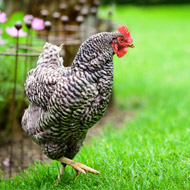British Hen Welfare Trust teams up with Defra

The British Hen Welfare Association is also collaborating with Government to revise the Great British Poultry Register.
The British Hen Welfare Trust has teamed up with Defra and its equivalents in Scotland and Wales to simplify information given to poultry keepers during times of disease outbreak.
The national charity has previously worked with the National Farmers Union and egg industry stakeholders to produce husbandry guidance for poultry keepers, including those kept as pets and on smallholdings.
In a press release, the charity said that it is now pleased to help authorities ensure that all poultry keepers, large and small, have the knowledge to look after their birds at all times.
“We re-home 50,000 commercial hens annually, so there is clearly a need to ensure all poultry keepers are fully informed on both general flock management and what to do in a period of disease outbreak,” explained Jane Howorth MBE, founder of the charity. “Anything that improves the flow and quality of information given to poultry keepers has to be a good thing for both the commercial and hobby sectors.
“Moreover as the charity has grown, we are now in a position to advise and add valuable input on key Government legislation, including the revision of the Defra Code of Welfare for Laying Hens which has not been updated since 2002.”
The British Hen Welfare Association is also collaborating with Government to revise the Great British Poultry Register with the aim of boosting numbers of poultry keepers signing up. They are also working on several other initiatives to ensure poultry keepers are given simple, effective and concise information.
The UK chief veterinary officer Christine Middlemiss, Scotland’s chief veterinary officer Sheila Voas and Wales’ chief veterinary officer Christianne Glossop said in a joint statement:
“Poultry keepers, large and small, have a vital role to play in helping to make sure that high biosecurity standards are used and maintained. This will ensure we are prepared as possible for any potential disease outbreaks.
“Working in collaboration with the British Hen Welfare Trust and its members will be key to getting this important message out to poultry keepers, especially pet owners, and we look forward to working with them now and in the future.”



 The RCVS has announced a new version of its 1CPD mobile app, with enhanced features for veterinary surgeons and veterinary nurses to record their continuing professional development.
The RCVS has announced a new version of its 1CPD mobile app, with enhanced features for veterinary surgeons and veterinary nurses to record their continuing professional development.